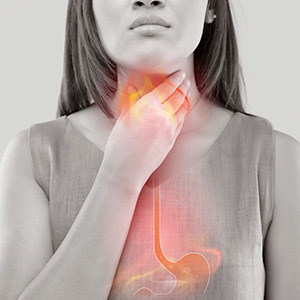
What is GERD?
Gastroesophageal reflux disease (GERD) is a chronic condition where stomach acid or bile flows back into the esophagus, causing irritation and discomfort. This backflow, known as acid reflux, occurs when the lower esophageal sphincter (LES)—a ring of muscle at the bottom of the esophagus—weakens or relaxes improperly. While occasional reflux is normal, GERD is diagnosed when acid reflux happens frequently, often more than twice a week, and interferes with daily life. Left untreated, GERD can lead to complications such as esophagitis (inflammation of the esophagus), esophageal strictures, or Barrett’s esophagus, which increases the risk of esophageal cancer. Understanding the causes of GERD and adopting preventive measures are crucial for managing it and improving quality of life.
Causes of GERD
GERD develops due to a combination of factors that weaken or impair the function of the LES or increase pressure in the abdomen, making acid reflux more likely. A weakened LES is the most common cause. Normally, this muscle opens to allow food and liquids into the stomach and closes to prevent backflow. However, certain conditions and habits can compromise its ability to function properly.
Dietary choices are among the primary triggers for GERD. Foods and drinks like spicy meals, fatty foods, caffeine, chocolate, alcohol, and acidic items such as citrus fruits and tomatoes can irritate the stomach lining or relax the LES. Eating large meals or lying down soon after eating can also increase the likelihood of acid reflux, as the stomach becomes overly full, placing pressure on the LES.
Lifestyle factors also play a significant role in GERD. Obesity is a major contributor, as excess weight increases abdominal pressure, pushing stomach contents back into the esophagus. Smoking weakens the LES and stimulates acid production, making reflux more likely. Similarly, excessive alcohol consumption can irritate the esophagus and reduce the LES’s effectiveness. Stress may also exacerbate GERD symptoms by affecting digestion and increasing acid production.
Certain medical conditions can increase susceptibility to GERD. A hiatal hernia, where part of the stomach pushes through the diaphragm into the chest cavity, disrupts the normal function of the LES. Pregnancy is another common cause due to hormonal changes and increased abdominal pressure from the growing baby. Additionally, some medications, such as aspirin, muscle relaxants, and certain blood pressure drugs, can contribute to GERD by affecting the LES or increasing stomach acidity.
Prevention of GERD
Preventing GERD involves a combination of dietary adjustments, lifestyle changes, and proactive habits that reduce the risk of acid reflux. Identifying and avoiding personal triggers is a key step in managing the condition. Adjustments in food choices can significantly reduce reflux symptoms. Avoiding known triggers such as spicy or fatty foods, caffeine, chocolate, and alcohol can help prevent acid production and LES relaxation. Eating smaller, more frequent meals instead of large portions can ease pressure on the stomach and reduce reflux episodes. It is also important to avoid eating within two to three hours of bedtime to allow the stomach enough time to empty before lying down.
Lifestyle modifications are equally essential in preventing GERD. Maintaining a healthy weight is one of the most effective ways to reduce abdominal pressure and minimize reflux. Even modest weight loss can significantly improve GERD symptoms for overweight or obese individuals. Smoking cessation is another critical measure, as smoking weakens the LES and increases stomach acid production. Quitting smoking not only reduces GERD symptoms but also improves overall health.
Elevating the head of the bed by six to eight inches can help prevent nighttime reflux. This adjustment ensures that gravity helps keep stomach acid from flowing back into the esophagus while you sleep. Sleeping on the left rather than the right side can also reduce reflux episodes, as this position places the stomach below the esophagus, minimizing acid flow.
Regular exercise is beneficial, but avoiding intense physical activity immediately after meals is important, as this can increase abdominal pressure and trigger reflux. Gentle exercises like walking or yoga can support digestion without exacerbating symptoms.
Another important aspect of preventing GERD is proactively managing stress. Stress can increase acid production and worsen reflux symptoms. Relaxation techniques such as deep breathing, meditation, or yoga can help reduce stress levels and improve digestive health.
For individuals taking medications that may worsen GERD, consulting with a healthcare provider is important. Adjustments to dosages or switching to alternative treatments can help reduce reflux while addressing the underlying medical condition.
Conclusion
GERD is manageable when its causes are understood, and preventive steps are taken. Factors like dietary habits, lifestyle choices, and underlying health conditions contribute to GERD’s development. Still, proactive measures can significantly reduce its impact. Adjusting eating habits, maintaining a healthy weight, quitting smoking, and elevating the head during sleep are effective strategies for preventing acid reflux and improving overall quality of life.
Individuals with GERD can minimize symptoms and avoid potential complications by understanding the triggers and adopting healthier behaviors. If symptoms persist despite these efforts, consulting a healthcare provider is essential for further evaluation and treatment. Early intervention can prevent more serious conditions and ensure long-term digestive health.
